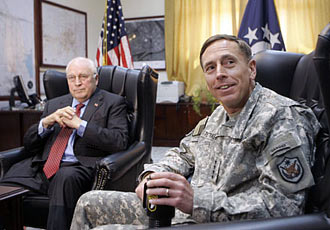| Home / Us and Iraq:Conflicts of Interest / News Update | Tools: Save | Print | E-mail | Most Read |
| Cheney in Baghdad to Push Reconciliation |
| Adjust font size: |
Visiting US Vice President Dick Cheney Wednesday pressed Iraq's Shi'ite Prime Minister Nuri al-Maliki to pass power-sharing accords with minority Sunni Arabs as part of benchmarks Washington says are key to ending violence. Cheney's unannounced visit, part of a Middle East tour, signals growing US impatience at Maliki's failure to reach agreement with the Sunnis as American military commanders build up troops to secure Baghdad. Cheney said discussions also centered on the crackdown in Baghdad, involving the deployment of 30,000 extra US troops, which is seen as a last ditch effort to stave off civil war between the Shi'ites and once-dominant Sunnis. "The meeting with the vice-president (laid) the foundation for practical steps in order to support our efforts on both the security front as well as domestic political issues," Maliki told a joint news conference with Cheney. Cheney said the talks also covered political and economic issues and added Washington would continue to support Maliki. "Obviously we talked about the way ahead in terms of our mutual efforts to help build an Iraq that is safe and secure, is self-governing and free of the threats of the insurgency and Al-Qaida," Cheney told reporters. US President George W. Bush is under mounting pressure from Democrats to show concrete progress in the four-year war, in which more than 3,300 US soldiers and tens of thousands of Iraqis have been killed. With US troops dying daily, American officials have urged the Iraqi parliament to scrap a planned two-month summer recess. During a visit to Baghdad last month, US Defense Secretary Robert Gates said progress on a package of laws that include a bill dividing up Iraq's oil wealth would be an important factor in Washington's decision to maintain higher troop levels. Earlier, Cheney met General David Petraeus, commander of US troops in Iraq, who is expected to deliver an assessment of the "troop surge" in September.
Cheney arrived in Baghdad on the same day a USA Today/Gallup poll showed six out of 10 Americans support setting a timetable for pulling US troops out, even though a clear majority predict civil war in Iraq if US forces withdraw next year. Last week, Bush vetoed a war-spending bill because it called for a pull-out of combat troops starting no later than October. A senior administration official who traveled with Cheney said the vice president's message boiled down to this: "We've all got challenges together. We've got to pull together. We've got to get this work done. It's game time." (China Daily via agencies May 10, 2007) |
| Tools: Save | Print | E-mail | Most Read |
 |
| Related Stories |
 |
 |
|
 |
| Links |
